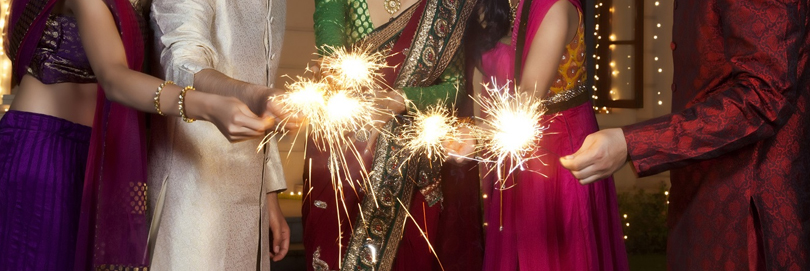
Diwali in North India starts at Dussehra. There are numerous legends and local customs associated with this festival, but common to all is the lighting of homes, pathways, temples, and even government buildings, with hundreds of small clay lamps and candles. Firecrackers, thought to frighten away evil spirits are also used with abandon, which makes this a particular popular festival for children.
On Diwali day, shops remain open till the afternoon, believing that good sales on Diwali day predict a prosperous year ahead. In the corporate sector, the process of buying and distributing Diwali gifts begins several days before the big day, and slowly picks up pace. Sweets and dry fruits are the most common gifts, as are silver coins. But gifts also range from silver dishes and other household gifts to suit-pieces.
In north India, around every street corner can be found the temporary stages for holding the Ramlila – a dramatic rendition of the story of the Ramayan, which continues for several evenings, culminating in the defeat of Evil (Ravana) by Good (Ram). In Himachal, as in parts of Punjab, Haryana and Delhi, gambling with cards picks up and reaches peak on the night of Diwali. Although traditionally Diwali is not celebrated by the Sikhs, they do participate in the festival to the extent of making a trip to the Gurudwara, and then lighting candles in the evening and letting off fire crackers as well.
Puja
During Diwali in North India, houses are decorated and a Lakshmi puja is organized. Often the women of the house do “aarti” to their husbands, garlanding him and putting a “tika” on him, while praying for his long life. In some houses, there is a ritual of immersing a silver coin in a tumbler of milk. The milk is then sprinkled lightly in the rooms of the house. Prashad is kept in front of the idol throughout the night.
Diya Patterns
In Himachal, every indoor corner of the house is lit up carefully, and a large diya, bigger than usual, is kept in the temple or puja place and is guarded all night through. In Bihar and UP, it is not always one large diya, but four smaller ones, intricately shaped, which surround the puja place and the women of the house sit guard all night to ensure they do not go out. Even the diyas placed outside, around the house are jealously guarded and re-lit at once, if the wind puts them out.
Diwali Recipes
Some of the specialities of Diwali in North India are: “patandas” – dosa like but made of flour and eaten with shakkar (jaggery powder) and ghee; “askloo” – pakodas made out of rice atta and eaten with either shakkar ghee or chutney; “poodas” or “mal poohas”– which are made of flour and sugar syrup and eaten with a chutney.
Source: Diwalifestival.org






























